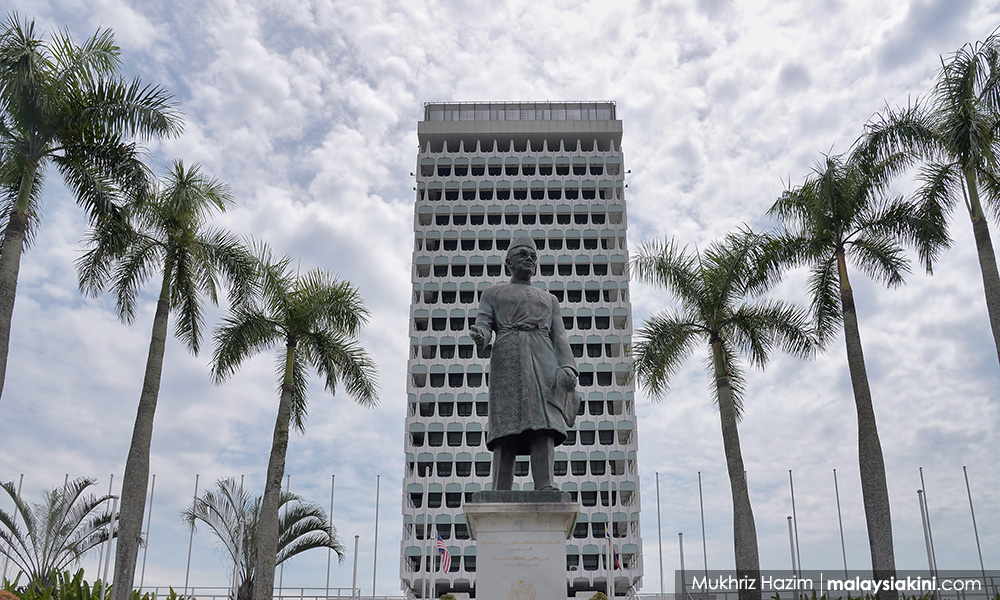MP SPEAKS | I read with alarm the media statement issued by the attorney-general on June 25, 2021 (Friday).
The media statement seems to give the following erroneous views:-
i. That the ultimate powers in a parliamentary democracy rests with the executive. This is repugnant to the very idea of a parliamentary democracy.
ii. That subsidiary legislation and laws can override the provisions of the Federal Constitution. This is a perverse interpretation of the law as the Federal Constitution is the supreme law of Malaysia.
The ultimate powers in a parliamentary democracy rest with Parliament
The ultimate powers in a parliamentary democracy rests with Parliament, whether the parliamentary democracy has a written constitution or otherwise. In Britain, where there is no written constitution, it has always been said that Parliament reigns supreme. In Malaysia where there is a written constitution, Parliament still reigns supreme in that subject to the conditions laid down in the Federal Constitution, Parliament has the powers to amend the constitution. (See Federal Court decision in Rovin Joty Kodeeswaran v Lembaga Pencegahan Jenayah, Ors and Other Appeals [2021] 4 CLJ 1).
The executive/cabinet is subservient to Parliament in that the formation of the cabinet is subject to the prime minister obtaining the majority support of the Dewan Rakyat. Article 43 (3) of the Federal Constitution also makes it plain and clear that the cabinet is collectively responsible (accountable) to Parliament. Nowhere in the Federal Constitution is it provided that Parliament may be suspended by the executive. The scope of Article 150 of the Federal Constitution dealing with an emergency is clear. Any powers exercised under this Article must be confined to and deal with the threat to the security, or the economic life or public order in the Federation. Therefore, Section 14(1) of the Emergency (Essential Powers) Ordinance 2021 suspending Parliament is ultra vires Article 150 of the Federal Constitution.
An adjunct law professor with Universiti Malaya, Professor Philip Koh TN, in his article which appeared in The Sun Daily on March 2, 2021, also holds the view that Parliament cannot be suspended or cancelled in its sitting by the Emergency (Essential Powers) Ordinance 2021 when it is part of the basic structure for supervisory authority over the executive powers. He opined that it cannot be that an instrument of law which has its validity from Article 150 can itself negate the very body which provided for its promulgation.
Any act or decision that is ultra vires is void. The court can declare it so even if there are legal provisions to oust the court’s jurisdiction to deal with the decisions of the executive as void decisions of the executive are no decisions (See House of Lords decision in Anisminic Ltd v Foreign Compensation Commission (1968) APP. LR 12/17 and Federal Court decision in Tenaga Nasional Bhd v Bandar Nusajaya Development Sdn Bhd (2016) 8 CLJ 163).
The position that the ultimate powers in a parliamentary democracy rest with Parliament is also recognised by the judiciary. The Federal Court in Rovin Joty Kondeeswaran held that the jurisdiction of the courts and the source of its powers are derived from federal law (Article 121 Federal Constitution) and federal law is defined by Article 160 (2) of the Federal Constitution to mean any act of Parliament.
I agree with the attorney-general that under a constitutional monarchy, the monarch does not function on his own initiatives but to act according to the Constitution. Article 40(1) of the Federal Constitution provides that the Yang di-Pertuan Agong (YDPA) is to act on the advice of the cabinet except otherwise provided by the Federal Constitution.

Article 55 of the Federal Constitution provides that it is the YDPA who summons Parliament to sit. Since there is a specific constitutional provision on the powers of the YDPA to summon Parliament to sit, the cabinet cannot usurp the powers as provided under Article 55. This is consistent with Article 40 itself. Therefore, it is erroneous for the attorney-general to conclude in his media statement that the YDPA may summon Parliament to sit only on the advice of the cabinet.
Does the YDPA then have full liberty to summon Parliament to sit? His powers are to be exercised in tandem with the other provisions of the Federal Constitution.
The position of Parliament under our Federal Constitution is very clear. It consists of the YDPA, Dewan Negara and Dewan Rakyat (Article 44). Since the YDPA is part of Parliament, it’s the intention of the Federal Constitution that Parliament may sit independent of the executive.
Article 62(1) of the Federal Constitution provides for each House of Parliament to regulate its own procedure. The Standing Orders of the Dewan Negara and Dewan Rakyat are made under this Article.
Pursuant to Article 62(1), the Dewan Rakyat has passed a legislation called the Standing Orders of the Dewan Rakyat. Article 62 (1) clearly provides that these standing orders are subjected to the Federal Constitution and any other federal law.
Since Article 62(1) regulates the running of the Parliamentary sittings, the YDPA will exercise his powers to summon Parliament to sit, consistent with the procedures laid down under Article 62(1).
Standing Order 11(2) of the Dewan Rakyat Standing Orders provides that the leader of the House will be the person to advise the YDPA when to hold the first sitting of the Dewan Rakyat and to advise the speaker when to hold any subsequent sittings.
Standing Order 11(2) itself expressly states that it is subjected to Standing Order 11(1) that the first sitting of Dewan Rakyat shall be held in such place on such date and at such hour as the YDPA may by proclamation.
Therefore, Standing Order 11 (2) does not take away the powers of the YDPA to summon Parliament to sit as provided under Article 55 of the Federal Constitution and Standing Order 11(1). So, when the leader of the House refuses to exercise his duties to call for Parliament to convene, the speaker should call upon the YDPA to exercise his powers under Article 55 and Standing Order 11 (1) to summon Parliament to sit.
To interpret that the prime minister who is answerable to Parliament has the absolute power to determine if Parliament sits or otherwise is an absurdity.
The Federal Constitution is the supreme law of the federation/Malaysia
This is clearly spelt out under Article 4 of the Federal Constitution. Any law passed which is inconsistent with the Federal Constitution to the extent of inconsistency will be void. None of the cases cited by the attorney-general in his media statement dispute this position.
The Federal Court in Rovin Joty Kodeeswaran held that no single provision in the Federal Constitution can claim superiority over the other provisions. However, Article 4 which declares the Constitutional Supremacy of the Constitution could not be suspended by any article in the Federal Constitution.
As explained above, the attorney-general erred in concluding that Article 40 of the Federal Constitution and Standing Order 11(2) of the Dewan Rakyat Standing Orders override the powers given to the YDPA to summon the Dewan Rakyat to sit under Article 55 of the Federal Constitution and Standing Order 11(1) of the Dewan Rakyat Standing Orders.
It intrigues me to find the attorney-general declaring some parts of the Emergency (Essential Powers) Ordinance 2021 as good law while others as bad law. He found Section 14(a) suspending Parliament as valid while Section 14(b) giving the YDPA power to summon Parliament to sit on a date deemed appropriate to his royal highness as invalid for a reason which I have pointed out was erroneous.

I would like to point out that under Article 150 of the Federal Constitution, after a Proclamation of Emergency is declared (if valid. The validity of the current emergency declaration is in dispute), Article 150 (5) provides that notwithstanding anything in the Constitution, Parliament may make laws with respect to any matter.
Under Article 150 (2B) when Parliament is suspended, the YDPA may promulgate such ordinances as circumstances appear to require. Apart from the powers conferred by Article 55, it is submitted that the power conferred by Section 14(b) to the YDPA to summon Parliament to sit overrides Standing Order 11(2) and Article 40 of the Federal Constitution. This position is supported by the Federal Court decision in Rovin Joty Kodeeswaran where it was decided that laws passed under Article 149 which provided for them to be valid even though they are inconsistent with other provisions of the Constitution are declared to be valid.
I am deeply troubled at how the attorney-general, being the highest legal officer of the land, could have interpreted the laws in the way he had. I am suspecting he may be interpreting the laws to suit the intent of the PN government.
Due to the attorney-general being in a possible position of conflict as the legal adviser to both the cabinet and the YDPA, I humbly hope that his royal highness the YDPA will seek independent legal advice to resolve the current impasse with the prime minister/cabinet. - Mkini
NGEH KOO HAM is DAP’s Beruas MP.
The views expressed here are those of the author/contributor and do not necessarily represent the views of MMKtT.




No comments:
Post a Comment
Note: Only a member of this blog may post a comment.